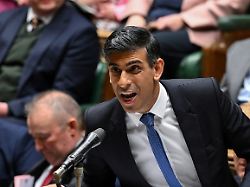Rwanda plan in the House of Commons
Sunak wins vote but is battered
January 18, 2024, 12:33 a.m
The House of Commons approves Prime Minister Sunak’s plan to deport illegal migrants to Rwanda. A victory for the head of government. But the right wing of the Tories will continue to push him forward.
It must have been a tough few hours for British Prime Minister Rishi Sunak, who emerged feeling battered despite winning the vote. In the dispute over his country’s asylum policy, he prevailed against resistance within the party. A new law to enforce deportations to Rwanda, East Africa, received the necessary votes in the lower house of parliament. This means that it has cleared another hurdle in the legislative process. But for Sunak, the dispute over the direction of the Conservative Party means a difficult start to the election year.
Several members of the right wing of the party had threatened to vote against their government because the law did not go far enough for them, and the plan is already being criticized by the UN refugee agency, for example. In the end, 11 of Sunak’s party colleagues voted against the bill, the PA news agency reported. A total of 320 MPs voted for and 276 against.
British politicians have been arguing about the issue for a long time. On Tuesday evening, dozens of Tories in the House of Commons voted for two amendments that would tighten the asylum law. “This is a serious attack on the authority of any prime minister,” commented BBC reporter Chris Mason.
Judicial review should be excluded
Essentially, it is about the conservative government’s plan to send irregularly entered migrants to Rwanda without examining their asylum applications and regardless of their origin. They should ask for asylum in the East African state, which critics accuse of human rights violations. They are forbidden from returning to Great Britain. To this end, Rwanda should be declared a safe third country by law. A further judicial review citing human rights in Great Britain should be ruled out.
But that doesn’t go far enough for the right-wing Tories. They demand that appeals before international courts must also be prevented – there should be no loopholes. Robert Jenrick, former Secretary of State for Migration and once confidant of Sunak, even called for withdrawal from the European Convention on Human Rights.
The Interior Ministry now wants to instruct officials that if the court in Strasbourg objects to deportation flights, they must consult the government. This should then decide whether to override possible objections. A union criticized this sharply: Civil servants would be faced with an impossible choice – either to break international law, to defy the government or even to resign their posts.
Migration has long since become one of the most important issues in the upcoming election campaign. The British must elect a new parliament by January 2025 at the latest. A date has not yet been set, but a vote is expected in the fall. The Tories want to use a decidedly tough approach to make up for the huge gap in polls to the social democratic Labor Party.
Deputy party managers resign
Significantly fewer irregular migrants arrive in Great Britain than in the EU. Opponents of the project such as the UN refugee agency are outraged. The plans violated obligations to protect refugees. The fact that the government wants to place itself above the courts by law also violates the separation of powers. The highest British court had declared the government’s plans inadmissible, citing, among other things, the situation in Rwanda.
The government has already paid hundreds of millions of pounds to Rwanda without anyone arriving there. The project is primarily intended to serve as a deterrent. It is still questionable whether this will actually happen in the end. The pact was once thought up by then Prime Minister Boris Johnson – according to critics, to distract from the “Partygate” scandal. In the next step, the law will now go to the British House of Lords, which is the second chamber in the legislative process.
Sunak defended the plan in the House of Commons. The voters want to solve the problem once and for all. For him, the agreement with the authoritarian President of Rwanda, Paul Kagame, is a central component of his promise to reduce the number of migrants. Sunak’s spokesman confirmed that the first deportation flights should take off by spring. In order to speed up proceedings, judges should be assigned specifically – judges’ associations question whether this is possible.
The fact that deputy party leaders Lee Anderson and Brendan Clarke-Smith resigned in protest on Tuesday evening meant a further setback. The two made it clear that they did not believe that the Rwanda draft would be successful in its current form. Anderson in particular, who has a talk show on the right-wing broadcaster GB News, was considered an important campaigner because of his outspoken nature. Analysts are now talking about a “civil war” in the Tory party. The dedicated campaign strategist Isaac Levido recently called on the group to unite. “Divided parties,” Levido said, “fail.”
